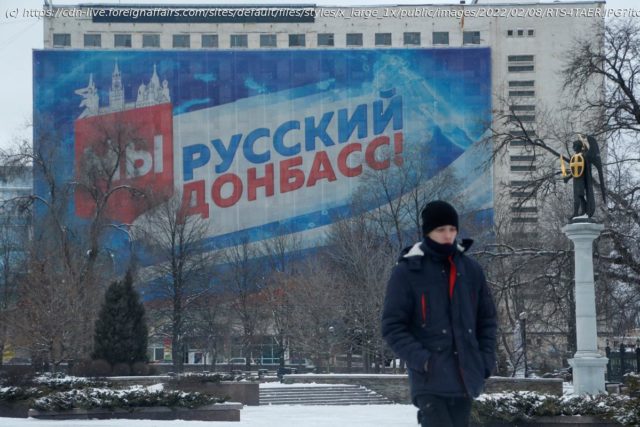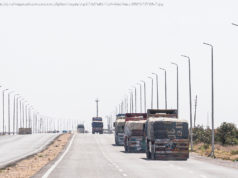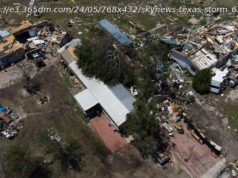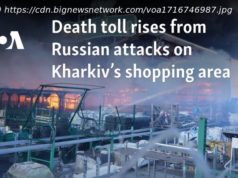Why an Attack on Ukraine Might Erode Putin’s Support
In a January 28 interview with the Russian media about the Ukraine crisis, Sergey Lavrov, the Russian foreign minister, said, “if it depends on the Russian Federation, there will not be a war.” He also suggested that there were “kernels of rationality” in the formal responses to Russia’s demands that the United States and NATO had delivered a few days earlier. To some Western commentators, Lavrov’s comments were a hopeful sign that the Kremlin had achieved its intermediate aims and might be shifting course. According to this analysis, Russian President Vladimir Putin had the West exactly where he wanted it: by moving more than a hundred thousand troops to the Ukrainian border and issuing an ultimatum, he had forced the United States and NATO to enter into a dialogue with Moscow. All along, then, the Russian government had been acting with calculated brinksmanship, pursuing an approach that has left the United States and its NATO allies with few choices other than to negotiate on an equal footing. For much of the Russian public, however, the Kremlin’s actions have looked very different. Amid widespread popular anxiety about the economy and the COVID-19 pandemic and growing fears of a large-scale war, the Russian government has seemingly raced headlong into an unnecessary and possibly reckless confrontation with the West. To Russian ears, even Lavrov’s recent conciliatory language has an unsettling ring. As the foreign minister continued, “We don’t want war, but we won’t allow anyone to trample on our interests or ignore them, either.” The words are familiar in Russia. According to the lyrics of “If Tomorrow Brings War,” a popular Soviet song from the World War II era, “We don’t want war, but we’ll defend ourselves / we’re rightfully strengthening our defense. / We’ll rout our enemy on hostile land / with little bloodshed and a mighty blow!” Shortly after the song seized the country’s imagination, the Soviet Union invaded Finland. As with Finland in 1939, the Kremlin keeps saying it wants to avoid a conflict but seems to be doing everything it can to provoke one. There have been frequent rumors about Russian efforts to create a pretext for war, including one involving the faked video about an attack by Ukrainians on the civilian population of the Donbas that surfaced in early February. Such tactics are similar to what the Soviet leadership did when it provoked the war with Finland. Amid weeks of analysis of Russia’s troop movements and Putin’s apparent motivations for the military buildup, there has been comparatively little attention given to what ordinary Russians think about the developments. Yet much can be learned from recent polling data. By many indications, Russians, including those who generally, if indifferently, support Putin, are deeply ambivalent about a conflict with Ukraine. Many fear severe economic consequences; given the role that Ukraine plays in Russian culture and history, some fear that a war would amount to Russia “fighting itself” (as the perestroika rock idol Boris Grebenshchikov put it in 1987). For Putin, who faces reelection in two years, these domestic anxieties are not insignificant. If Russia enters a protracted war in Ukraine, it could threaten the broad popular base on which Putin has relied for more than 20 years. Outwardly, many Russians seem to support the Kremlin’s warlike stance toward the West. In the interview with Lavrov, Margarita Simonyan, the head of Russia’s RT news network, passed on the question that her social media followers had been asking: “When are we going to hit Washington?” Although Simonyan’s own hawkish views have done much to stir up such questions, the Kremlin’s basic position about defending itself from Western encroachment has often seemed to find support. As one focus-group respondent to a recent opinion survey commented, “Russia will have to respond… We are being pinched from all sides; they’re biting us. What are we supposed to do? Give in?” There is also a precedent for the Kremlin’s assertive foreign policies winning popular support at home. In 2014, following the annexation of Crimea, Putin’s public approval ratings skyrocketed. For many, the Crimean Peninsula carries special significance. To the average Russian, it is a Russian imperial territory with a Russian-speaking population and a crucial military bastion in Sevastopol. Thus, the capture of Crimea was perceived by many Russians as an important consolation for the collapse of the Soviet empire, the righting of a historical injustice. But unlike the current crisis in Ukraine, the annexation of Crimea did not involve a confrontation between two heavily armed forces. Putin retook the peninsula, like Catherine the Great had in 1783, without a single shot being fired. By contrast, any campaign to reassert Russian power in Ukraine now seems almost certainly to be both violent and protracted. And on the specific issue of an actual war, many Russians seem to be deeply apprehensive.






